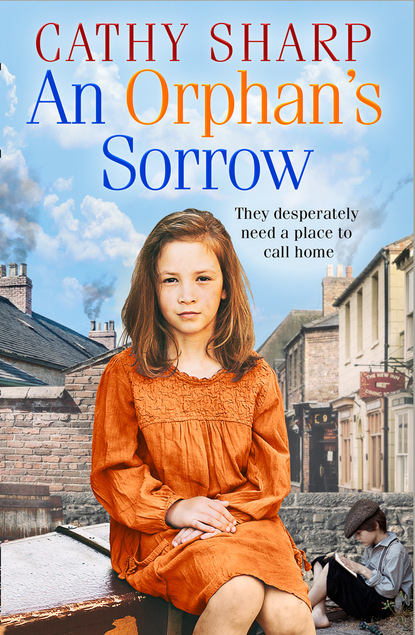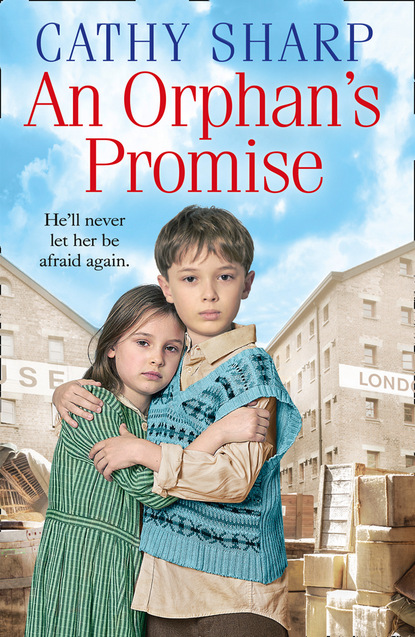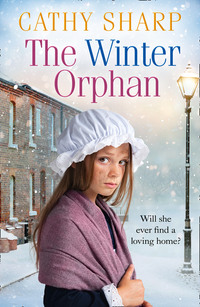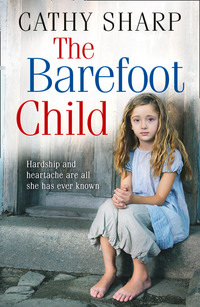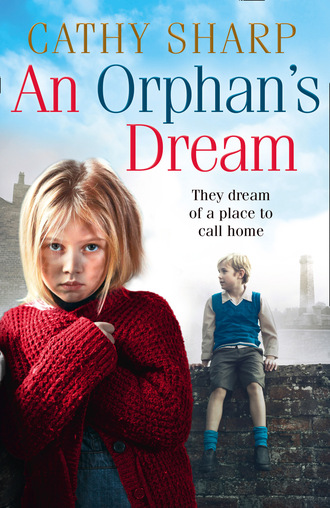
Полная версия
An Orphan’s Dream
‘We don’t know what’s brought them down, Danny love,’ she’d told him that day on the bus, when speaking of the vagrants. ‘Some of them had homes once but ill fortune or the drink took them low. The demon drink is an evil thing, Danny. Your father used to drink too much but I won him from it and he promised me he would never get drunk again when we wed. He’s fallen once or twice but mostly he’s kept his word to me – I’d box his ears if he didn’t and he knows it.’
Danny felt the sting of tears as he remembered. His mum had been a good ’un and she’d loved him. She’d stood up to his father and for some reason the big man had always backed down before the small woman. Danny could still remember the smell of the lavender water she sprinkled on her clothes and the sheets too, because she said it helped you to sleep.
Why did she have to die and leave him alone with his father? Danny knuckled his eyes to stop the tears as he walked away from the house. The gutters were choked with filth, paint peeling on windows and doors, and at this early hour no eyes peered from behind grey net curtains. His face hurt and his body ached all over, and he had a sick feeling inside. He wanted to get as far as he could away from his father and the misery of the past few months. He knew it was going to be cold and he might often be hungry, but he’d got his grandfather’s trinkets and his coat, and he would manage somehow. Mum had said the tramps went to a soup kitchen at the Sally Army every day to be fed, and Danny’s mouth watered as he thought of hot soup and thick bread, and a mug of strong tea. His belly ached with the need for food, because he hadn’t eaten much for days and he wasn’t sure when he would eat again. He wasn’t even sure how far it was to the place he’d seen with his mother, where the tramps had been sitting around a fire in an old steel drum, drinking from bottles and huddling into their blankets. If he could find them, perhaps they might share their fire and tell him where the Sally Army handed out their soup and bread.
Danny knew the archway was down by the river so he reckoned he just had to head for the dockyards and keep walking until he found somewhere to sleep. Perhaps he might even find someone who would give him food for running an errand or carrying things. Danny was twelve, thirteen in August, but he was tall for his age and, though thin, well built; if he lied, he could get away with pretending to be fourteen and therefore old enough to work. He wouldn’t mind working if he got the chance and would do anything that was asked of him. Danny wasn’t going to be like his father and drink his life away!
Mum wouldn’t have liked to think of her son living rough, but Danny didn’t know what else to do. He couldn’t stay with his father any longer, because one of these days Jim would kill him in a drunken fit. He’d rather take his chances with the tramps under the arches. One of them had seen him watching them that day with his mum, and he’d grinned at him. Danny had thought he looked approachable. If he could find someone like that to teach him how to go on, he would be all right – the only other alternative was to go to school and let his teacher report him to the welfare.
Why should he let them send him away to a home somewhere when he was nearly old enough to leave school? Danny wasn’t sure what orphanages were but he knew his mum didn’t approve of them, so they couldn’t be good. He would be working in another year or so and he might as well find a job now if he could. Brushing the tears from his cheeks, Danny stuck his head in the air and strengthened his stride. His father wasn’t going to break him and he didn’t want to be packed off to Canada or Australia, like some unfortunate kids his mother had told him about.
‘I’ve heard all sorts of stories over the years, Danny love,’ she’d told him, scraping marge and jam on a thick slice of her freshly-baked bread for him. ‘Terrible it is. They’re taken from their family and sent all that way on a ship. Now I think that is a disgrace. We might be poor but I wouldn’t let them send my boy to a home or a place I’ve never seen. Them folk think they can do what they like with you, Danny. Once they’ve got you, you’ve had it – it’s what they say that goes.’
Danny’s mother hadn’t liked orphanages. She said people did things to the kids there, things they didn’t ought to, so Danny would live rough and eat whatever he had to eat to get by, but he wouldn’t go in one of those awful places. But he wasn’t going to be a tramp all his life. He was going to find proper work and then he’d have a room of his own and he’d be just fine. His dream of having a warm comfortable home with a mother and father that loved him was just that, an impossible dream. There was only him now and he had to learn to look after himself.
CHAPTER 3
‘Thank you, Kathy,’ Mary Thurston, Matron of the Rosie, said to the young woman who had brought up a tray of tea. She’d remembered to use their best china in honour of their visitor and that was well done in Mary’s opinion. ‘That is most welcome, my dear.’
The girl blushed, smiled and left, closing the door behind her. Mary looked at her visitor as she poured tea for them both. ‘Milk and one sugar I think?’
‘Yes, thank you, Mary.’
Mary handed her one of the best cups reserved for important visitors. ‘So, what can I do to help you, Rosalie?’
‘I don’t think there is anything much just now. I really came to update you, Mary.’ Lady Rosalie sighed as she took a file from her large leather bag. ‘Sometimes I think the list of homeless children is never-ending,’ she said as she gave Mary Thurston a sheet of paper. ‘This is my list of possible foster carers. There are twelve on the list and I think we may get eight or nine good families from it. We have to be so very careful, Mary. I don’t want a repeat of what happened to young Charlie!’
‘No, indeed,’ Mary said. Charlie and his sister Maisie had been in her care at the Rosie and they’d found him a foster home when his sister was ill but he was badly treated and ran away and since then Lady Rosalie had been even more careful about vetting prospective foster parents. ‘And how many homeless children have you at the moment?’
‘Twenty-five,’ Lady Rosalie replied and sighed. ‘All of my children are older – the adoption societies take the babies and very tiny children for whom they can find adoptive parents easily, but the children of six years and older are more difficult to place, particularly when they come from broken homes and are inclined to be difficult.’
‘Yes, I do understand how hard it must be,’ Mary said. Being Matron of the Rosie infirmary seemed an easier task compared to the one her friend faced. Placing a child with a bad foster parent could lead to all sorts of problems, even death at times – and it was so difficult to find enough of the right people, because it wasn’t just a matter of background or even how well off they were: character and kindness were far more important in a foster parent. ‘I am still looking for candidates for your list of carers, but unfortunately, I seem to add to your list of children needing care more often than I do your kind and honest carers.’
‘Yes, and I’m glad you do tell me about necessary cases,’ Lady Rosalie said and smiled. ‘Well, keep your ears open for suitable foster families, Mary – and ring me whenever you need to.’
‘Yes, I shall.’ Mary smiled at her. She glanced at her watch and tutted; how fast the time went when she had company! ‘I must make a tour of the wards – and I dare say you have another meeting to attend?’
‘No, for once I’m going out to lunch with a friend,’ Lady Rosalie said and smiled. ‘Geraint was a friend of my husband. He lost his wife eighteen months ago and had to come up to London for some business today and so we decided to have lunch together.’
‘Well, that will be a nice change for you,’ Mary nodded approvingly. ‘I’m sure you deserve to be taken out for lunch – and I hope you have a lovely time.’
‘Yes, of course I’m bound to,’ Lady Rosalie replied. ‘One sometimes forgets one is still young enough to enjoy life.’
Mary nodded. She would be here at the infirmary the rest of the day and the evening too. Her little apartment was in what would be termed an attic by some but was comfortable and had all she needed; it meant she was able to be the first in every morning and only left the building to go for a walk in the fresh air or to seek some sleep when she could no longer continue at her desk. Her life had little of interest outside the Rosie these days and she occasionally thought that she really ought to take a holiday but thus far she hadn’t found the time.
Sister Rose smiled at her colleague, Staff Nurse Alice Burwell, as they prepared to swap over for the night. Alice was taking her turn on the late shift and had come in fresh and bright to check the records for the children’s ward.
‘Just three cases to watch at the moment, then,’ she said. ‘It looks like being a quiet night.’
‘Yes, providing you don’t get any sudden admissions,’ Rose said and yawned. ‘Oh dear. I’m tired. I’m going straight home to bed.’ She smothered another yawn.
‘Have a good rest. It is sometimes good to be single, isn’t it, and not have a husband and children to look after?’
Rose nodded and left her, switching her thoughts from the busy day in the ward and for a moment allowed herself to think of the man she’d once loved – or thought she did, until she learned that he was already married and cheating both her and his long-suffering wife. The worst thing of all was that he’d had four young children and he’d vowed that he would leave them all for Rose!
‘I think that is terrible, Mike,’ she’d told him, outraged. ‘It isn’t just that you deceived me, it’s your wife and children – how could you ever think of deserting them? I could never love a man who could do that!’
‘I couldn’t help falling in love with you, Rose. You’re so wonderful.’ He’d gone on and on, extolling her beauty and her character, trying to flatter her into taking him back.
Rose hadn’t listened to his excuses. He’d begged and pleaded but she’d left him standing there in the street and hadn’t looked back. Later, in her bedroom, the tears had come, her heart breaking because she had loved him desperately.
Were all men as shallow as Mike Hardy? If they were, then, she, Rose Harwell, wanted nothing more to do with them.
She would never have gone for that first drink with him if she’d guessed he was married and had children and it was no wonder she hadn’t trusted anyone enough to love again since. Yet she had no real desire to be single, and though she would miss nursing desperately, would much prefer to be at home with a husband and perhaps a couple of kids. Or was it too late for her to have that sort of life? Should she accept that she had nothing but her nursing and her friends?
A sharp tingle went down Rose’s spine as she thought about the clever doctor she’d started to like – more than like, if she told the truth, but she was still wary, still unsure that she could trust Dr Peter Clark.
Most of the time, Rose was sure about what she wanted in her life. She liked Peter a lot and she wanted children of her own; she hadn’t realised how important that was to her until she held her brother John’s first daughter, Harriet, in her arms. The feeling it had given her made her melt inside and she’d realised that perhaps her job wasn’t going to be enough for the rest of her life. Rose wanted marriage and children. Perhaps deep love wasn’t necessary. She’d been hurt too much that first time and she didn’t intend to let anyone hurt her again that way. Much better to marry because you liked someone and you got on well – much safer.
Just as she reached the bottom of the stairs, she saw someone entering the front door and stopped, catching her breath. It was as if she’d conjured him up by thinking of him! What was he doing here? None of the children were sick enough to warrant a doctor being called out. ‘Sister Rose.’ Dr Peter Clark looked at her anxiously. ‘Matron asked me to call. One of her patients is very ill – a woman in her seventies I understand?’
‘I’m on the children’s ward at the moment.’ Rose smiled at him, brushing a strand of her flame-red hair away from her face. ‘I’m glad to say we don’t have any children who need urgent attention from a doctor just now.’
He smiled and his face lit up, the serious look banished. ‘I’m glad about that,’ he murmured.’ His eyes were very blue as he looked at her and she noticed that his dark blond hair was too long again and fell forward into his eyes; he brushed it back impatiently. ‘I’d better go and see what Matron wants.’
Rose nodded and walked on quickly, her heart racing. If only Peter Clark would say something to give her a clue as to his feelings! She sensed that he liked her and she knew for a fact that he wasn’t married – Rose had asked about that the first time he smiled at her in a way she thought was special. He was always pleasant to her and she felt that he went out of his way to speak to her each time he was called to the infirmary – and yet he hadn’t asked her out and he’d given no indication that he wanted to be more than a colleague.
Perhaps that was why he’d caught her imagination. Had he been the same as most men she met, making flirtatious eyes at her and asking her out on every occasion, Rose would probably have labelled him a flirt and that would have been that; she wouldn’t have given him a chance. It might be because he made no advances to her that she liked him and had begun to trust him, not just as a doctor – she knew he was brilliant at his work! – but also as a man.
Rose lifted her head as she emerged into the dark streets about the infirmary. Situated at the end of Button Street, the Lady Rosalie Infirmary was right in the heart of the East End of London. Little alleys, mean narrow streets, crowded courts and the broader main streets were all known to her, because she’d grown up only a short distance away, down near the dockyards. Now she lived only a few streets away in a decent lodging house in Bell Lane, which ran off from Shilling Street in a tangent. To get there she had to pass through some rough areas and it made her acutely aware of the extreme poverty of many living in this part of London. It was no surprise to Sister Rose that children came into her ward half-starved and filthy dirty, with nits in their hair and suffering from all kinds of illnesses, including broken bones and bruises. Often their parents were so poor that a slice of bread and dripping was a luxury for the kids and they never saw an orange or even a boiled egg. Most of them thought it was heaven being in the Rosie, where they were fed with good nourishing food.
Shivering, she pulled her coat collar up, glad of the knitted beret pulled over her glossy hair and her warm scarf. She pinned her thick hair up in a French pleat at the back of her head to keep it neat for work. Mike, before she’d discovered he was married, had once told her that her hair had the red-gold flame of a field of ripe corn at harvest time …
Rose walked swiftly towards the end of Button Street. The street lamps weren’t particularly bright and she glanced over her should once, half fearing she was being followed. She’d been followed by a thug once before, but even as he’d tried to steal her nurse’s bag a young man had appeared out of the gloom and driven him away. He’d taken her attacker in an arm lock and escorted him away, calling out over his shoulder that he’d see it didn’t happen again. Rose hadn’t even had the chance to thank him properly, and she had no idea of her hero’s name. Yet she knew that, despite the poverty and the rogues that lurked in these mean streets, there were many honest, brave young men like him who wanted no praise for helping one of the Rosie’s nurses. Folk round here respected the staff of the infirmary, who did all they could to help when they were sick. In the dim light she hadn’t even seen the face of her rescuer clearly, but she’d thanked him in her head many times.
There was no one behind her now and Rose turned into Shilling Street and crossed the road, heading for Mrs Robinson’s house at the end of Bell Lane. It was icily cold tonight and she would be glad when she was inside in the warm. A sigh of relief touched her lips as she entered the kitchen and the homely face of her wonderful landlady greeted her with a bright smile.
‘Well, there you are, Rose. Tired and hungry I’ll be bound. I’ve got a lovely fish pie in the oven and there’s carrots and leeks to go with it, my love – and a nice cup of tea.’
‘Did I ever tell you I think my guardian angel was looking after me when I found you, Beattie?’
Beattie Robinson beamed at her. ‘That you have, my love – and he was looking out for me too, because I needed a lodger and there are some awful folk about – but I got you and I couldn’t be happier.’ Rose had come to the lodging house after her mother could no longer look after herself or be left on her own. Rose paid for her to be cared for by a widowed cousin who was grateful for the extra income and had been a nurse herself, so knew how to care for the mother who hardly knew Rose these days. Rose had found the lodgings cheaper than having to run her own home and although she now earned more, was too comfortable here to think of moving into a house of her own.
She went to Beattie and put her arms about her ample waist. ‘I can smell that pie and it makes me hungry. They feed us at the Rosie – but nothing like you cook!’
‘Sit you down and I’ll serve,’ Beattie said, ‘and then you can tell me all about your day.’ Beattie always wanted to know everything. ‘How is that Matron doing and all your patients then?’
‘Thank you so much for coming to see me, doctor,’ Matron said and rose to her feet as they shook hands. ‘My patient is very unwell. Her fever keeps rising no matter what we do – and I can’t put my finger on the problem.’
‘I’ll be glad to take a look at her. At seventy she should be able to pull through an operation for the removal of a gall bladder. I can’t see why she has a continuing fever – unless there is an infection.’
‘Yes, I think that may well be the case – but I don’t know why. Her dressings have been changed regularly and the wound is healing nicely.’
‘Outwardly,’ Dr Peter Clark agreed. ‘It may be an internal infection – and they are the worst because we can’t do very much about them.’
It was true. A wound to the skin or a limb could be kept clean, swabbed with a disinfectant and healing balms, but there was nothing yet available that would cure an internal infection. You could calm a fever with medicines but if the infection ran too deep it too often killed the patient.
Following Matron to the ward, Peter glanced at the neat rows of beds, each surrounded by curtains which were drawn back to allow the patients to see what was happening. Several of the patients knew him and smiled or waved a hand and he smiled back. He was known to many of these people because he gave much of his time to the East End poor free of charge. Some of his fellow doctors at the London Hospital said he was mad not to ask for payment but Peter didn’t care. He was fortunate to have been left an inheritance which meant that, if he chose, he could sit at home all day or visit a gentleman’s club and drink port wine. But Peter enjoyed being a doctor. There was, in his opinion, nothing better than seeing a sick patient recover and go home to their family.
The curtains around Mrs Edie Simpson’s bed were closed and she was lying with her eyes closed, her face flushed – too flushed. He felt her forehead, finding she was clammy and damp with sweat. Clearly, she had a fever and it made him frown, because he knew her operation had gone well.
He pulled the covers back and then inched her nightdress up to reveal the dressing, which he deftly removed. It looked perfectly clean and when he bent to sniff it there was no smell of putrefaction, which hopefully meant it wasn’t the surgery that had caused this fever.
Using his stethoscope, he listened to her chest and frowned. She seemed perfectly fine – but the fever was a cause for concern. Turning, he looked at Matron.
‘Do we have a ward where she can be placed in isolation?’
‘Yes, there is a small room at the end of this ward, Dr Clark, but—’
‘I’m not suggesting she has anything nasty but I think we should take precautions. It is just possible that she was incubating some kind of infection before her operation and it has now come out.’ Replacing the nightgown to its proper place and drawing up the bedcover, he frowned. ‘I suggest isolation and sponging regularly to cool her down – and something to ease her; she’s moaning a little and may be suffering pain.’
‘Yes, doctor.’ Matron looked relieved. ‘You don’t think it is due to the surgery then?’
‘No, I believe she may have brought this in with her – and that’s why I want her in isolation. Gloves, aprons and masks when the nurses look after her. We don’t want whatever she has to spread, do we?’
‘No, doctor.’ Matron smiled at him. ‘I’m so glad you came. I was really concerned that we’d mistreated her.’
‘That she was being nursed well was never in doubt,’ he said. ‘I’ll wash my hands and then leave you, Matron, but please don’t hesitate to call me again if you need me. Either I or my assistant will come whenever we are needed.’
Matron nodded. His assistant was a nice young man but he knew she preferred his personal attendance because, she said, he was so certain and sure – and gentle with the patients. Some of the doctors could be rough and Matron was known to disapprove of that, because a sick person needed gentle kindness, not abrupt words or careless actions.
After washing his hands thoroughly in the basin at the end of the ward, Peter left the Rosie and went out into the night. He hoped the patient’s fever would turn out to be something simple but there was always a chance it could be nasty.
Walking briskly in the night air, Peter’s thoughts turned to the young woman he’d spoken to briefly on his arrival at the infirmary and he smiled. He’d been attracted to Sister Rose from the first moment he’d seen her but some of his colleagues had warned him to watch out.
‘She hates men,’ the senior clinician, Richard Harris, had told him. ‘I asked her for a drink at Christmas about two years ago and she nearly bit my head off – told me she wasn’t interested in no uncertain terms.’
Peter had heard similar stories from other doctors who had tried to interest Sister Rose in a date and failed. At first, she’d seemed a bit frosty with him but recently her smiles had been warmer and he’d been tempted to ask her if she wanted to go for a meal or something, but his natural caution held him back. Peter had loved a young nurse at his training hospital but Sheila had been a terrible flirt and although she’d gone out with Peter for some months, he’d discovered she was dating others behind his back, and sleeping with them too.
When he taxed her with it, Sheila had laughed and said she wanted a good time before she settled down to one man and boredom. Her scorn had hurt him for a while but he’d got over it. A woman who gave herself to anyone that easily wasn’t worth breaking your heart over. So, he’d got on with his job – which he loved – and dated other young women casually, often in a group with other young medical personnel. It was fine while he was young and not particularly looking for a steady relationship, but one day he wanted a loving wife and a family. Although he lived in a small, family-run hotel, which was situated close to the London Hospital where he worked two days a week, he could afford a nice house with a garden, and that was what he wanted. He might even set up as a GP one day, with his own surgery, but it would still be in the East End of London. A country practice wasn’t for him. While there were many sick people everywhere, something about the spirit of the East End people appealed and he liked treating them and seeing them go back to their hard lives with new hope.
Smiling, Peter found his modest and ancient Ford car – still with all its wheels intact. The lads round here would pinch anything but they knew the car was his and any lad who tried to nick his wheels would have his ear clipped by one of the others and told to leave Doctor Peter’s car be.


